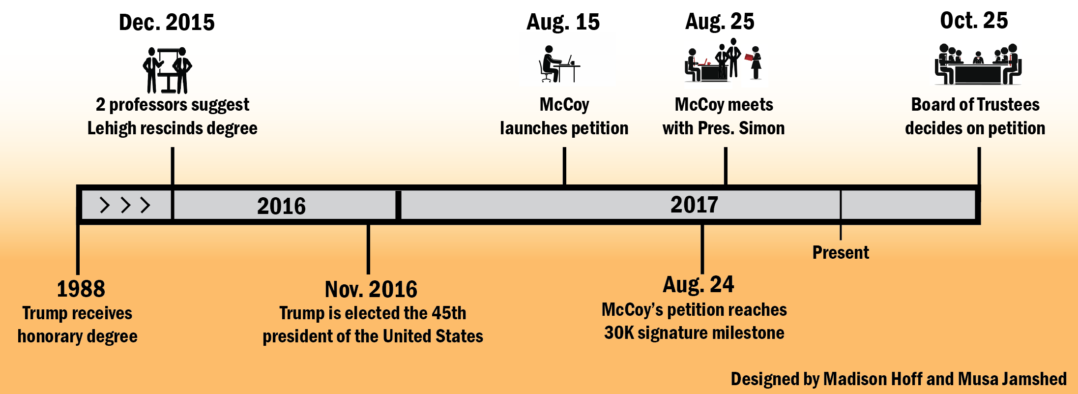 Kelly McCoy, ’17, an alumna who started the viral Change.org petition to rescind President Donald Trump’s honorary Lehigh degree, met with President John Simon, General Counsel Frank Roth and two professors for over an hour on Aug. 25 to discuss Lehigh’s response to the issue.
Kelly McCoy, ’17, an alumna who started the viral Change.org petition to rescind President Donald Trump’s honorary Lehigh degree, met with President John Simon, General Counsel Frank Roth and two professors for over an hour on Aug. 25 to discuss Lehigh’s response to the issue.
The petition, which outlined the ways in which Trump’s speech and actions violated Lehigh’s Principles of Our Equitable Community, surpassed 30,000 signatures in just over a week and attracted widespread media attention.
Roth will present his notes from their discussion with McCoy at the next board of trustees meeting, which is scheduled for Oct. 25.
McCoy – who, full disclosure, is a former design editor for The Brown and White – had suggested the meeting in her first email to Simon and used it as a platform to explain her support for the revocation of Trump’s degree in greater detail.
Also present at the meeting were professors Rick Weisman and Ziad Munson, who had reached out to McCoy to lend their support as senior members of the Lehigh faculty who have been involved in similar efforts.
Weisman, a professor emeritus of engineering, had written a letter nearly two years ago asking the board of trustees to reconsider whether Trump’s actions aligned with the values of the university. He later worked with Munson and other faculty members to start a petition that was limited to Lehigh affiliates, which was delivered to Simon after collecting nearly 1,000 signatures.
Though the board did not respond to that initial petition, Weisman and Munson felt a responsibility to use their positions at the university to continue advocating for the cause.
Munson, a sociology professor, said he felt a duty to support McCoy’s efforts because he is a tenured faculty member who has more security in expressing his point of view than other members of the campus community might.
“There’s a lot of people who are reticent to speak out about this,” he said. “It is not a coincidence that the two faculty members who went to this meeting were white men with tenure. In discussions with other faculty, there were tenured faculty members who were not white men who did not feel like it was safe enough on this campus to be talking about these kinds of issues.”
Munson said this speaks to the crossroads the university community is facing. The decision about the Trump petition, in his view, will be an important symbolic indication of the direction Lehigh’s leadership is choosing to go when it comes to racial equity.
In the meeting, McCoy raised the parallels between Trump and comedian Bill Cosby, whose honorary degree was rescinded by the board of trustees in 2015 after he admitted under oath to “behavior that is antithetical to the values of Lehigh University and inconsistent with the character and high standards that honorary degree recipients are expected to exemplify.”
The board of trustees rescinded Cosby’s degree without any prompting from the Lehigh community.
Cosby had been under public scrutiny for claims by more than 40 women accusing him of sexual assault.
Trump has had many sexual assault allegations leveled against him, including one by his ex-wife, Ivana. After the infamous Access Hollywood video was released of Trump boasting about sexually assaulting women, Munson began to consider the overlap between the two cases.
“Why would the board, on its own, rescind the degree of a black man but was taking no action for a white man who engaged in morally equivalent sorts of behavior?” he asked.
Munson said though Trump and Cosby are different people accused of different things that came to light under different circumstances, he believes those differences tend to be at the level of legalistic details.
“In the general patterns that we’re looking at,” he said, “I think that they are morally equivalent and the main difference is that one man was black and the other man is white.”
In making their decision about revoking Trump’s degree, the board faces a quandary between ethical and fiduciary responsibility.
“(The fiduciary responsibility) should weigh on their decision,” Weisman said. “I think Lehigh has taken decisions in the past that have impacted donors and sometimes those decisions have been done for, to me, the right reasons.”
He cited decisions made while President Peter Likins was in charge that were controversial at the time, such as hiring the first black woman — Lorna Hunter — as Lehigh’s director of admissions, allowing a gay community to be visible on campus, handing out condoms at the health center and even adopting the Mountain Hawk as a mascot instead of the Engineer. In those cases, the university stood by its decisions, despite pushback from board members and alumni.
As for the argument some critics of the petition have raised about the potential for a “slippery slope,” Munson said the board of trustees opened that door when they rescinded Cosby’s degree.
Munson said he feels strongly that it is in the board’s best interest to rescind Trump’s degree to not only uphold the university’s values, but also to remain consistent and racially neutral in the application of those standards.
“As we continue to receive messages from the leaders of the university about the Principles of Our Equitable Community, as we continue to increase the number of staff positions that are there to support the principles, and we continue to put increasing requirement on students and faculty and staff to meet them,” Munson said. “All of those efforts and resources are undermined by our inaction or silence on this issue.”
Weisman explained the question of how the board chooses to uphold, and even enhance, the stated values of the university is more important to him than whether or not the board rescinds Trump’s degree.
“They can’t just have a discussion amongst themselves, decide to rescind or decide to not rescind with no explanation,” Weisman said. “They have to communicate with the community… and this is their chance to be accountable.”
Munson echoed Weisman’s sentiment, saying that in the absence of rescinding the degree, the board owes the Lehigh community an explanation that “speaks to how Trump’s behavior is more in line with the Principles of Our Equitable Community than Cosby’s was and addresses and speaks to the racial issue about why an African American honoree faced scrutiny by the board but white honorees like Trump have not.”
Munson said he did ask Simon to take a public stand himself on the issue, but Simon said he didn’t think it was his role.
Neither Simon nor Roth has the power to make a choice on behalf of the university. That decision lies in the hands of Lehigh’s board of trustees.
The Brown and White reached out to both men for comment, and in response received a statement from Lori Friedman, Lehigh’s director of Media Relations, who confirmed the board of trustees has received the petition and will consider it.
“As an education institution, Lehigh University values academic freedom and the open exchange of ideas,” Friedman wrote in an email. “We respect the right of faculty, students and other members of the community to express their views.”
Weisman and Munson both expressed their respect for Simon, Roth and the board members, and said they understand that university administration may have a different view of the potential revocation.
“I know (Simon and Roth) well enough to know that they do have personal thoughts, they do have political feelings, but they are not going to allow their personal thoughts and feelings to interfere with their professional role in this situation,” Weisman said. “And I admire that.”
McCoy described the August meeting as “very cordial.”
“I left feeling heard in my position, which was basically all I wanted,” McCoy said. “This is only the beginning of the conversation about this.”





Comment policy
Comments posted to The Brown and White website are reviewed by a moderator before being approved. Incendiary speech or harassing language, including comments targeted at individuals, may be deemed unacceptable and not published. Spam and other soliciting will also be declined.
The Brown and White also reserves the right to not publish entirely anonymous comments.
2 Comments
Why is it that you people can’t seem to realize that stuff like THIS is why Democrats keep losing? You can’t just go around and demand that history be changed because it hurts your feelings. And before you start calling me a ist, let me be perfectly clear: I’m a registered Democrat, and voted for Hillary. But it doesn’t take a political scientists to realize that ridiculous demands like this cost the Dems’ the 2016 election, and the special elections. I’ve never seen or heard of any Republicans trying to change the past like this just because they dislike the person in question, and I wholeheartedly believe that requesting this is ONLY going to hurt your cause. Even if you mean well.
I did not vote for Hillary and could not stomach voting for President Trump either. My protest vote went to someone else. Please table this agenda until Trump is out of office, he is our president, like it or not. Resist the urge to take out your frustrations on an easy target. Pray that he not only doesn’t screw it up too much but that he accomplishes some real good.
If action is required now, send a letter of reprimand to those who gave the honorary degree. Trump has not changed much in the intervening years. I would have been happy if he never got the honorary degree. Wait until it becomes ex-president Trump to see if revocation still holds its appeal.